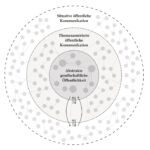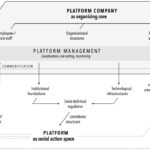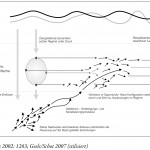18. Dezember 2018
In der Zeitschrift Information Research ist eine Rezension zu unserem Buch »Collectivity and Power on the Internet« erschienen:
The whole book is devoted to the investigation of collective social actors on the internet, their rise, specific features, means of acquiring and losing power on the internet, their role online and technology role in their activities, and the basis of continuing survival.
[…] Chapter 2 provides a basic typology of social actors involved in collective actions on the Internet, starting with spontaneously emerging short-term swarms or flash-crowds to institutionalized production-oriented communities. […] Chapter three critically examines the social movements and changes that the use of digital technology has brought to their activities.[…] Social media do not replace mass media or conventional forms of protest, but enhance the possibilities of networking and feedback beyond the scope of social movement or protest event.
[…] I have found very interesting the next chapter on open source communities, which exposes the loss of their disruptive edge and the new role in the strategy of innovation as incubators of new solutions. […] I liked the classification of the open sourse software projects in relation to two axes of corporate leverage and levels of coordination that helps understanding the variety of projects and initiatives in this field. The most impressive part […] is the discussion of the present state of the open source initiatives and the future potential of openness discourses for the economic and political fields.
The final chapter on the competition and power of the main Internet companies was both most interesting and probably least new to me. I appreciated the logic and the depth of the arguments that were employed to reveal the sources of power, the nature of competition, and the strategies leading to success of the five dominant internet companies. […]
19. November 2018
Der anwendungsorientierte Band »Co-Creation. Reshaping Business and Society in the Era of Bottom-up Economics« ist erschienen – darin auch mein kontextualisierender Beitrag »Understanding Open Source Software Communities«. Über den Band:
Across several industries, we are observing a paradigm shift from traditional, firm-centric and top-down value creation to more open and collaborative approaches, also referred to as bottom-up economics. The boundaries of firms dissolve and external actors (customers, user, suppliers etc.) enter the domain of value creation by means of advanced information and communication technologies. These new and evolving patterns require a renewed and interdisciplinary understanding of how co-creation enables organizations to reshape business and society.
With contributions from industrial and academic experts, this book provides deep insights into the theory and practice of bottom-up economics, and addresses the major opportunities and challenges that have emerged in the era of co-creation.
2. September 2018
Im Sommer ist die diesjährige Ausgabe der seit 1959 durchgeführten Allensbacher Markt- und Werbeträgeranalyse (AWA) zu den Konsum- und Mediengewohnheiten der deutschen Bevölkerung (23.389 Befragte insgesamt; Herbst 2017 / Frühjahr 2018; Grundgesamtheit: deutschspr. Bevölkerung ab 14 J.) ist erschienen. Einige Ergebnisse:
Internetnutzung
- 54 Prozent der Befragten gaben an, dass Internet ständig oder mehrmals täglich zu nutzen, 23 Prozent gaben »einmal am Tag, mehrmals in der Woche«, 5 Prozent »höchstens einmal in der Woche« zu Protokoll.
- 90 Prozent der 14- bis 29.-Jährigen und 55 Prozent der +30-Jährigen gaben an, mit dem Smartphone mobil online zu gehen.
5. August 2018
Nachfolgend Ausschnitte aus einem im Herbst erscheinenden Diskussionspapier zu offenen Werkstätten und Collaborative Commons — Teil 2 von 3 (Teil 1):
In der BRD gewannen politisch begründete DIY-Praktiken, nachdem sich in der Nachkriegszeit aus wirtschaftlichen Engpässen heraus bereits eine Kultur des Selbermachens ausgebildet hatte (z.B. entlang der Schnittmuster der Zeitschrift Burda Moden), mit den Umweltbewegungen der 1970er-Jahre an Prominenz (Andersen 1997): Neben im Fernsehen omnipräsenten Natur- und Tierfilmern wie Horst Stern und Bernhard Grzimek, die Umweltsünden stetig expliziter herausstellten, stellte der 1972 erschienene Report »The Limits to Growth« des Club of Rome den zuvor in der Bevölkerung verankerten Fortschrittsglauben in Frage und schuf ein Grundverständnis für ökologische Ungleichgewichte (Engels 2006; Brand et al. 1997). Eine Antwort auf das daraus resultierende Unbehagen bestand in alternativen Szenen nach dem großpolitischen Scheitern der »68er«-Bewegung in einer Änderung des persönlichen Lebensstils, der sich von Marktzwängen freizumachen suchte und in einer Wiederentdeckung des kleinen Handwerks mündete (Radkau 2011). Eine koordinierende Funktion übernahmen Stattzeitungen, die in ihrer Aufmachung Ähnlichkeit zum WEC aufwiesen (Drücke 1998).
Die konzeptuelle Basis hinter dieser Hinwendung zu dezentral organisierten Produktions- und Konsumweisen bestand – neben einem Konvolut an alarmierenden Schriften zum naturzerstörenden Einfluss des Menschen (Hermand 1991) – in zahlreichen großindustriekritischen Arbeiten u.a. von Robert Jungk (1973), Otto Ullrich (1977) und Ernst F. Schumacher (1973). Insbesondere Schumachers Vorstellung einer »economics of permanence«, die großen Einfluss auf die internationale Umweltbewegung hatte, nahm zentrale Ideen einer Postwachstumsgesellschaft vorweg und sah den Schlüssel für ein Überleben der Menschheit ähnlich wie Stewart Brand in einem veränderten Umgang mit existenten und künftigen Technologien:
»[…] a technology with a human face, is in fact possible […]. It serves production by the masses instead of mass production. […] I have no doubt that it is possible to give a new direction to technological development, a direction that shall lead it back to the real needs of man, and that also means: to the actual size of man. Man is small, and, therefore, small is beautiful. To go for gigantism is to go for self-destruction.« (Schumacher 1973: 117f.)
Weiterlesen »
16. Juli 2018
In der aktuellen TATuP – Zeitschrift für Technikfolgenabschätzung in Theorie und Praxis findet sich eine Rezension von Maximilian Roßmann zu den Büchern »Kollektivität und Macht im Internet« sowie »Collectivity and Power on the Internet« von Ulrich Dolata und mir. Roßmann kommt dabei zu folgendem Schluss:
»Das Buch liest sich einerseits als gelungene Erklärung von Macht und Kollektivität im Internet entlang der Co-Evolution von Open-Source-Projekten und Plattformanbietern. Es mag durchaus überraschen, dass all die großen Open-Source-Projekte klassische Organisationsformen teilen und in ökonomischer Abhängigkeit zu den Internet-Riesen existieren. […] Andererseits taugt das Buch auch als praktische Einführung in die problemorientierte Forschungsheuristik des akteurszentrierten Institutionalismus. Hervorzuheben ist die Kritik am Technik-Determinismus der Digital-Utopien […]. Die Ausgangspunkte und die Typologie des Buches zeigen sich jedenfalls äußerst vielversprechend für eine zeitgemäße und problemorientierte Technikgeneseforschung, die Bedingungen digitaler Welten ernst nimmt ohne davon geblendet zu sein.«
13. Juli 2018
Im Juli 2018 ist das HBS Working Paper Forschungsförderung 87 mit dem Titel »Plattformökonomie und Erwerbsarbeit. Auswirkungen algorithmischer Arbeitskoordination – das Beispiel Foodora« von Jasmin Schreyer und mir erschienen. Der Klappentext:
Die plattformbasierte ›Sharing Economy‹ mit ihren ambivalenten Effekten auf die Arbeitswelt gerät zunehmend in den Blickpunkt der öffentlichen Aufmerksamkeit. Das vorliegende Papier befasst sich mit den Potentialen und Risiken intermediärer Plattformen sowie algorithmischer Koordination für die Strukturierung und die Bedingungen von Erwerbsarbeit. Zunächst arbeiten wir allgemeine Organisationsprinzipien und Funktionsweisen onlinezentrierter Plattformunternehmen heraus. Daran anknüpfend beleuchten wir am Beispiel des Unternehmens Foodora bis dato beobachtbare Dynamiken und Rückwirkungen plattformbasierter Arbeitskoordination.
20. Juni 2018
Das Programm des 39. Kongresses der Deutschen Gesellschaft für Soziologie, der von 24.–28. September in Göttingen stattfinden wird, ist online. Neben dem Plenum »Digital Lives«, zu dem ich zusammen mit Marc Mölders einen Beitrag leisten werde, möchte ich an dieser Stelle auf das abwechslungsreiche Programm der Ad-Hoc-Gruppe »Grenzen der Quantifizierung in der Datengesellschaft« aufmerksam machen (Freitag, 28.9., 9:00–11:45 Uhr), die ich zusammen mit Michael Eggert organisiere:
- Wie die Daten der amtlichen Statistik den Alltag beeinflussen (Hans-Ullrich Mühlenfeld, IT.NRW)
- Die algorithmische Konstruktion der sozialen Wirklichkeit
(Alina Vogelgesang, RWTH Aachen)
- Predictive Policing und das Polizieren per Quantifizierung (
Simon Egbert, Universität Hamburg)
- »Withering away of interpretation«? Datenkunde und interpretative Sozialforschung als (alte) Werkzeuge für (neue) Fragen zu digitalen Massendaten
(Karoline Krenn, Fraunhofer FOKUS & Lilli Braunisch, TU Berlin)
- Quantifizierungsdynamiken in wissenschaftlichen Bewertungsprozessen (Barbara Hendriks, Martin Reinhart, HU Berlin & Cornelia Schendzielorz, DZHW)













